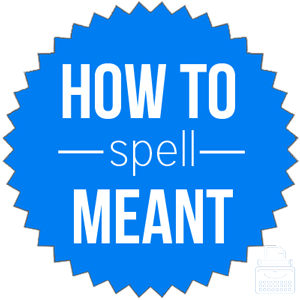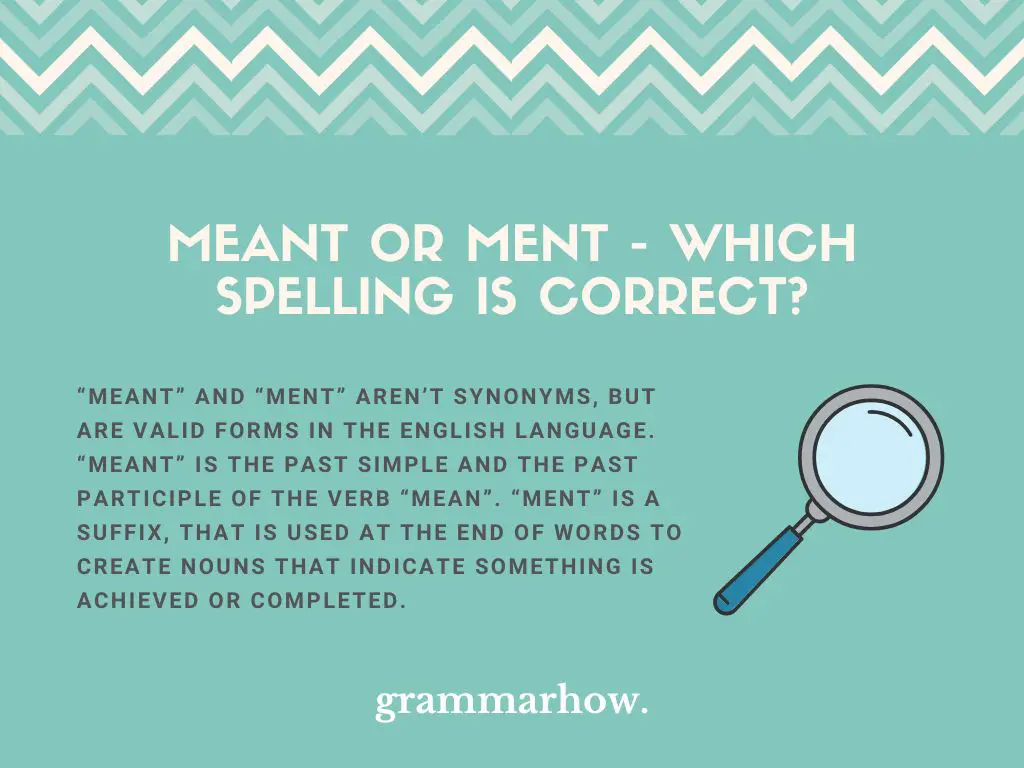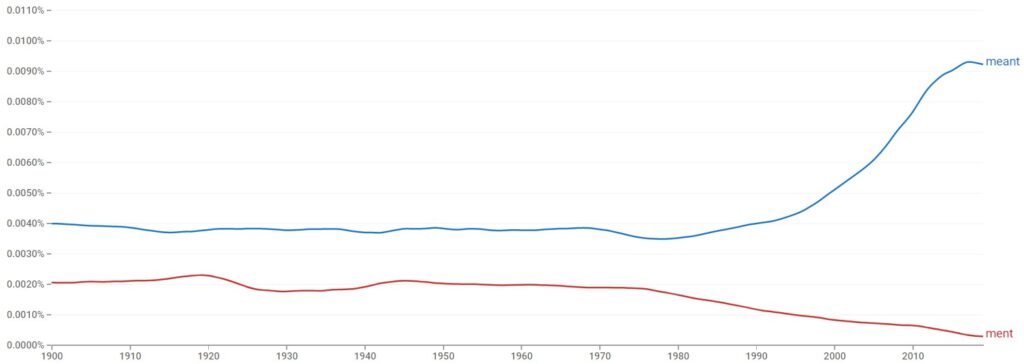Spelling of Meant: Meant is spelled m-e-a-n-t.
Definition of Meant: Meant is the past tense and participle of the verb mean.
The verb mean is defined as to have in the mind as a purpose; to design for or destine to a specified purpose or future; to serve or intend to convey, show, or indicate; to have importance to the degree of; to direct to a particular individual.
Pronunciation of Meant: Meant is pronounced ment.
How to Use Meant in a Sentence
What does meant mean? Meant is the past tense and past participle form of the verb mean. Mean is the act of having a particular purpose or intention in mind, or, designing something or saying something for a specific purpose or reason or person.

For example,
- I meant what I said yesterday.
- What I meant was it’s better for you if you tell her the truth.
- That letter was not meant for you.
- If it’s meant to be, it will be.
- Before you explained the meaning, I never understood what that saying meant.
- This word now means something entirely different than what it meant in Shakespeare’s day.
Phrases & Idioms That Use Meant
Mean business: to be serious and/or diligent.
- Now, people are realizing that, when he said he meant business, he wasn’t joking.
Mean well: to have good intentions; try to be helpful or kind.
- I know her constant corrections were annoying, but she meant well.
History & Etymology of Meant
Meant is the past tense and past participle of mean. Mean was first used before the 12th century, according to Merriam-Webster’s.
Mean comes from Middle English menen via Old English maenan, which is akin to Old High German meinen, meaning to have in mind.
Synonyms for Meant
Since meant is the past participle/tense, the synonyms listed here are for the present tense, mean. However, to form the past, simply add the appropriate suffix, which is usually “-ed”.
- Denote
- Express
- Intend
- Aim
Outside Examples of Meant
- Hackers hid malware in CCleaner, a popular app meant to clean out cookies and junk programs from Android phones and computers to make them run faster. – USA Today
- An order of very limp French fries that were meant to go with our entrees appeared with the appetizers. – Orange County Register
Summary
Meant is the past tense and past participle of the verb mean, which is used most commonly to denote intention, purpose, significance, or reason.
Contents
- 1 How to Use Meant in a Sentence
- 2 Phrases & Idioms That Use Meant
- 3 History & Etymology of Meant
- 4 Synonyms for Meant
- 5 Outside Examples of Meant
- 6 Summary
Asked by: Annamae Vandervort III
Score: 4.5/5
(66 votes)
Spelling of Meant: Meant is spelled m-e-a-n-t. Definition of Meant: Meant is the past tense and participle of the verb mean.
What is meaning of meant?
Meant is the past tense and past participle of mean1. 2. adjective. You use meant to to say that something or someone was intended to be or do a particular thing, especially when they have failed to be or do it. I can’t say any more, it’s meant to be a big secret.
How do you use meant in a sentence?
Meant Sentence Examples
- I never, ever meant for her to get hurt.
- I never meant to make you feel that way.
- Little Lucy had not meant to whisper.
- A gentleman asked me what BEAUTY meant to my mind.
- Sleep meant one thing – nightmares.
What’s the difference between mean and meant?
Mean is the present tense. Meant is the past tense and past participle. Mean is also an adjective meaning nasty, cruel, unkind.
What does for mean?
English Language Learners Definition of for
—used to indicate the place someone or something is going to or toward. —used to indicate the person or thing that something is sent or given to. —used to indicate the thing that something is meant to be used with.
19 related questions found
What does and mean in texting?
& means «And.»
How do you use the word for?
For is usually a preposition and sometimes a conjunction.
- For: purpose. We use for to talk about a purpose or a reason for something: …
- For someone. We often use for to introduce the person or people receiving something: …
- For: exchange. We use for to refer to an exchange: …
- For in multi-word verbs.
What I meant to say meaning?
mean to say
To intend to say; to really mean. Sorry, what I meant to say was that I’ll be 30 minutes late, not early.
Does it mean or meant?
Mean is simple present tense. Meant is simple past tense. In that sentence, meant would be correct because could is simple past tense.
How do you write meant?
Spelling of Meant: Meant is spelled m-e-a-n-t. Definition of Meant: Meant is the past tense and participle of the verb mean.
Are Meant sentence?
Meant sentence example. A gentleman asked me what BEAUTY meant to my mind. Sleep meant one thing – nightmares. The car would be replaced by the insurance that was meant to replace her parents’ car.
What I mean vs what I meant?
I mean is present tense and i meant is past tense. Exp. I mean, not every day you get the chance to go on vacation. I meant to take the garbage out earlier, but I forgot.
What was ment?
Ment is defined as a result, condition, process or is defined as of doing something. An example of ment is movement, which is the changing of position. An example of ment is payment, which is what is paid by a person. An example of ment is retirement, which is a person taking themself out of the workforce.
What is the use of in English?
We use of when we want to show that people or things relate to other things or people. For example, when we want to say that something or someone belongs to or is a part of something or someone else, we can do it like this: Tiffany stared at the floor of her room.
What is the meaning of in chat?
1 : chatter, prattle. 2a : to talk in an informal or familiar manner. b : to take part in an online discussion in a chat room. transitive verb. chiefly British : to talk to especially : to talk lightly, glibly, or flirtatiously with —often used with up.
What’s the meaning of meant to be?
DEFINITIONS1. if something is meant to be, it seems certain to happen, usually because it has been decided by God or other forces that people believe cannot be controlled. Oh well – it was just not meant to be. Synonyms and related words.
What is the past tense of means?
The past tense of mean is meant or meaned (nonstandard or obsolete). The third-person singular simple present indicative form of mean is means. … The past participle of mean is meant or meaned (nonstandard or obsolete).
What does I was meaning to ask you mean?
It means that your intention was to ask about him but for some reason you did not get to do it. See a translation. 2 likes.
Do you mean to say meaning?
(Do) you mean to say (that) (something is the case)? Used to elaborate upon something bad that someone else has said and that one finds hard to believe.
What’s the difference between OF and FROM?
The use of the word of indicates possession whereas the use of the word from denotes distance. This is another important difference between the two prepositions of and from. The preposition from is often followed by another preposition ‘to’. On the other hand, the preposition of is often replaced by an apostrophe.
What is without in grammar?
from English Grammar Today. The preposition without means ‘not having something’ or ‘lacking something’: I can’t drink tea without milk.
What is the word for symbol?
Words related to symbol
design, emblem, figure, pattern, image, token, motif, indication, type, logo, badge, stamp, attribute, mark, note, denotation, representation, device, numeral, regalia.
“Meant” and “Ment” sound the same. But are those words synonyms?
We want to know which is the correct spelling, when comparing “Meant” and “Ment”. We also want to know what they mean and which of those forms should be avoided. Let’s discover the proper way to use those words.
“Meant” and “Ment” aren’t synonyms, but are valid forms in the English language. “Meant” is the past simple and the past participle of the verb “Mean”. “Ment” is a suffix, that is used at the end of words to create nouns that indicate something is achieved or completed.
Take a look at some examples:
- Frankie ment to say something different. (incorrect)
- Frankie meant to say something different.
- Running a marathon is quite an achievement.
- Parents should keep the focus on their child’s development.
The first set of examples is about things that Frankie may or may not have intended to say. Maybe they “Meant” it, maybe they didn’t. The point is that “Ment” means nothing in that context and doesn’t work as a stand-alone word. Only “Meant” is acceptable here.
The second set of examples brings words that use the suffix “-Ment” to make sense and convey their meanings: “achievement” and “development”. There are many others, because “-Ment” is a suffix we use a lot. Now you know what it means and what’s its purpose.
Meant
“Meant” is the past tense and the past participle of the verb “Mean”, which is to express or represent something, such as an idea, thought, or fact. Whenever you need to refer to this concept in the past tense, you should use “Meant”.
The Cambridge Dictionary expands on the meaning of “Mean” and, consequently, the meaning of “Meant”: “to have a particular result, to intend”.
Take a look at some examples:
- I hadn’t meant to say that and I want to apologize.
- She meant well but her actions backfired.
- I wasn’t meant to be here but I’m happy I am.
- Laura said it meant nothing at all.
- I think this isn’t what Howerd meant by his words.
Ment
“Ment’ isn’t a word, especially not an alternate form for the word “Meant”. But it’s a very important suffix in the English language, that indicates achievements or concrete things.
According to The Cambridge Dictionary, the suffix “-ment” is “used to form nouns that refer to an action or process, or its result”.
Let’s take a look at some examples that include words that contain the suffix “-ment”.
- Do you know when the payment is due?
- Wow, what an achievement!
- This is a great disappointment, you know?
- I need to speak to management about what happened today.
- Don’t make any sudden movements.
Every sentence includes a word that contains the “-ment” suffix: “payment”, “achievement”, “disappointment”, etc. “-ment” doesn’t stand on its own as a word, but it plays a relevant part in the English language as a complement that allows for nouns to make sense and convey the correct meaning.
Which Is Used the Most?
We have a guess as to which one of those forms is used more often. But we are curious to see the graph anyways. Do you think people use more “Meant” or “Ment”?
Take a look at the graph from Google Ngram Viewer below to find out.
“Meant” is the prevalent word, which is used much more often. The graph shows that this word has been increasing considerably in usage since 1980, which indicates that people are using it now even more than they used to use it before.
“Ment”, on the other hand, seems to be decreasing in use. We’re not sure, however, if the graph should be taken into consideration when evaluating the importance of the prefix “-Ment”.
Since the suffix “-ment” is always attached to another word, we think the graph may not be reflecting all instances in which “-ment” is used. Nevertheless, “Meant” is the form that appears more and that’s what counts for us here.
Final Thoughts
“Meant” and “Ment” are relevant forms in the English language, but have different meanings and purposes. “Meant” is simply the past simple and the past participle of the verb “Mean”. “Ment” is a suffix that, when attached to words, creates nouns that refer to things that are achieved or completed.
Martin holds a Master’s degree in Finance and International Business. He has six years of experience in professional communication with clients, executives, and colleagues. Furthermore, he has teaching experience from Aarhus University. Martin has been featured as an expert in communication and teaching on Forbes and Shopify. Read more about Martin here.
Subjects>Arts & Humanities>English Language Arts
Wiki User
∙ 9y ago
Best Answer
Copy
The spelling is «meant» (past tense, past participle of to mean).
The spelling -ment is a suffix that can form nouns from verbs (e.g. accomplishment).
Wiki User
∙ 9y ago
This answer is:
Study guides
More answers
Wiki User
∙ 10y ago
Copy
Meant is the correct spelling.
This answer is:
Add your answer:
Earn +
20
pts
Q: How do you spell meant or ment?
Write your answer…
Submit
Still have questions?
Continue Learning about English Language Arts
How do you spell ment?
Meant… As in «he was meant to have it.»
How do you spell ment as in I meant to ask you?
Meant.
What is the suffix of excitement?
-ment
What is the suffix of the word government?
Ment
How do you spell meant as in i just meant her?
The past tense of the verb to meet is met (e.g. I just met her today).The past tense of to mean is meant (e.g. That’s what he meant to say).
Related questions
People also asked
На основании Вашего запроса эти примеры могут содержать грубую лексику.
На основании Вашего запроса эти примеры могут содержать разговорную лексику.
пишется слово
написать слово
произнести слово
пишется это слово
How to spell the word ‘cat’?
How do you spell the word «rocket»?
Meanwhile, a little girl writing a story wants to spell the word dog.
В то же время, девочка пишет рассказ и хочет написать слово дом.
Ask them to spell the word «world» backwards.
Попросите человека написать слово «земля» в обратном направлении.
He taught me how to spell the word.
10 A synonym is a word you use when you can’t spell the word you first thought of.
Барт СИНОНИМ в Словаре Одно предложение, определения: слово, которое вы используете, когда не можете произнести слово, о котором вы сначала подумали.
At another tournament, he cursed his opponent that he could not even spell the word «poker».
На другом турнире он проклинал своего соперника и уличал в неспособности даже написать слово «покер».
I mean, practically flunking, missed 100 days of school, and you can barely spell the word «cat,» but sure.
Завалил все предметы, прогулял 100 дней, и едва можешь написать слово «кот», но да конечно.
How do you spell the word enchanting?
how to spell the word ‘orange’?
How to spell the word ‘fish’?
So if you need to know how to spell the word «stupendous» in your DNC report, just give us a shout.
И если ты захочешь узнать как пишется слово «изумительный» для своего отчета, свистни нам.
Forgot how to spell the word «use.»
Teach him how to spell the word «three.»
Рады помочь вам узнать, как пишется слово «в-третьих».
Last night I spent an hour Trying to remember how to spell the word «heighth.»
Вчера ночью я целый час вспоминала, как пишется слово «длинношеее.»
how to spell the word ‘orange’?
Have you ever been to a job interview and been asked to spell the word «team» on a piece of paper?
Вы когда-нибудь проходили собеседование при устройстве на работу, где вас просили написать слово «команда» на листке бумаги?
Even if the visitors looked like they did not even know how to spell the word «etiquette,» I still asked them courteously, «May I ask who this is?»
Даже если посетители выглядят так, словно не знают, как пишется слово «этикет», мне все равно пришлось вежливо произнести:
For example, while Keller had one hand under running water, Sullivan helped her spell the word «water» with the other.
Например, в то время как Келлер держала одну руку под проточной водой, Салливан помогала ей произнести слово «вода», держа другую ее руку.
Hasn’t it ever happened to you that all of a sudden and for no reason at all you haven’t the faintest idea how to spell the word… which or «house»…
С тобой никогда не случалось, что вдруг безо всякой причины ты забываешь, как пишется слово «Который»?
Результатов: 70. Точных совпадений: 70. Затраченное время: 61 мс
Documents
Корпоративные решения
Спряжение
Синонимы
Корректор
Справка и о нас
Индекс слова: 1-300, 301-600, 601-900
Индекс выражения: 1-400, 401-800, 801-1200
Индекс фразы: 1-400, 401-800, 801-1200



